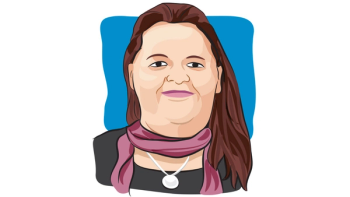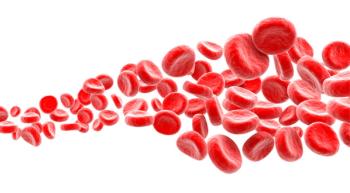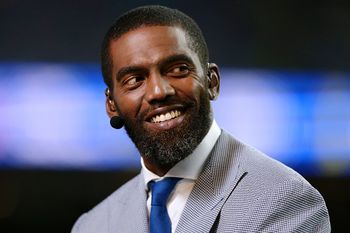
Survivorship: After Non-Hodgkin Lymphoma Treatment Ends
Transcript:
Loretta J. Nastoupil, MD: You have just completed your sixth cycle of R-CHOP [rituximab, cyclophosphamide, doxorubicin hydrochloride, vincristine sulfate (Oncovin), prednisone] therapy, and we’re looking forward to what the future holds. I think there is sometimes anxiety on the part of the oncologist and the patient. We know that you’ve had good scans along the way, but what is the real likelihood of this being your very last treatment and you being able to move on and return to your normal life? I think those are the questions that I have, probably more importantly than you have, and we’re now headed down that journey.
Whitney is, again, at the end of the completion of her chemotherapy, but I view lymphoma and cancer as a spectrum that goes from the day you are diagnosed until the day you pass away. Hopefully you will pass away at the normal life expectancy from something other than cancer. If that happens, I’ve done my job well. But we will be a part of your journey throughout your whole life.
There are times when I’m managing chemotherapy and I am delivering good or bad news in which we’re talking about a plan as to how to tackle that. There is going to be a point in time when we are no longer going to be focused on lymphoma and just focus on your general health.
Now, again, it’s important to know that there are several different types of lymphoma. You have a type that should be cured. There are points in time when we will use the term “cure,” and there are points in time where we talk about remission. Right now, you are in remission. It’s important to have those discussions with your oncologist. It’s important to feel comfortable saying, “I’m cured.” When do you no longer need to worry about this?
I have my own definition on when you’re cured and when you no longer need to worry, which is probably different from your perspective and your definition. Generally, when you hit 2 years out and your lymphoma has not come back, we feel pretty confident that there is a 99% chance of it never coming back.
Then our focus shifts and we start talking about, again, is your heart healthy? Are you going to live a normal life expectancy? Do we need to worry about other cancers that may come along because you’ve had one? “You’ve had chemotherapy. What is the risk for other cancers?” Those are the types of conversations and the focus of our conversations. Let’s hear your perspective on that.
Whitney Neighbors: I think you’ve already articulated exactly what my anxiety is. I probably wouldn’t ever say that I’m cured. I think I always have that in the back of my mind: I was bitten once and I could be bitten again. I think that’s probably a normal response. I don’t know what your experience has been. This is a life-changing event. You take for granted that “I just have a little lump on my neck.” No, this is going to be different for the rest of your life.
And so, I do have that anxiety that sits with me. Everything else that we’ve talked about has been accurate. It’s worked. It has come through. I have hope that I’m going to be that person who gets to use the word “cure.” But for the time being, I just have to wait. I think it’ll take a long time for me to get comfortable that this is behind me, and, hopefully, never in front of me again.
Right now, it’s with me. I have to live with it every day. I treat it like I’m living with it every day. Yes, I have the comfort of knowing that I had clear PET scans, but the lifestyle changes that I’ve made to make my body stronger and healthier are things that, to me, are now just how I have to live my life; not “I’m through with cancer. I get to go back to the old way.” That’s how I feel about this.
Loretta J. Nastoupil, MD: Those are good thoughts. We will do a series of scans over the next few years. Each doctor has a different approach to this because there are not good clinical trials or evidence to tell us how to do this. I think that creates some anxiety. You may talk to other patients who are on a different schedule or may not be getting scans. There will also be a point in time when we will talk about not getting any more scans. That creates more anxiety. From my perception, it’s very different when you’re undergoing chemotherapy. We talk about side effects and talk about when your next cycle and next PET scan is going to be. We transition to talking about, “I don’t think this is going to come back. These are the things you need to call me about.” That’s when we start talking about symptoms.
The other question that will come up is, “Well, I had no symptoms,” or “I just had this lump. What should I be watching for now that you’re done with treatment?” Anything could happen again. You could have a lymph node in the same area or in another area. You may experience weight loss and progressive fatigue. You may have no symptoms, and we may get a scan and find that there’s something there that needs to be explored.
Everyone will have a different experience. I think it’s important to know that unless you have another biopsy that suggests your lymphoma is back, we don’t rely on scans alone. We will listen to you talk about symptoms, and we will be concerned. We’ll also be concerned if you have something else happening in your life that’s just getting worse and worse and no one can figure it out.
I had a patient who was having progressive back pain. The patient thought it was sciatica. They were doing physical therapy and it just kept getting worse. Finally, someone ordered an MRI and we found that their lymphoma had recurred. So it may not be as simple as a lymph node that you can feel or weight loss or night sweats or fevers. It may be a symptom that’s progressive. Until we get a scan and look into things further, we may not know it’s lymphoma.
Not to alarm anyone, but I think that is the thing we focus on the most. Your oncologist can guide you, in terms of what that timeframe is for which we need to be worried about lymphoma. With the type that you have, once you hit 2 years out, or even 1 year, we sigh with big relief. We feel that you’re going to do well. Again, I think that’s where we’re headed here.
If you don’t do well, what’s happened in the field of lymphoma in the last few years? The one thing that’s changed things dramatically for something that you’re living with is CAR [chimeric antigen receptor] T-cell therapy, where we harvest your immune cells to modify them and give them back. So there are transformative things that have come along within the last year that should give hope to all patients—whether you’re someone who is cured and we’re just worried about you getting back to your normal life or you are someone who is facing a situation where their lymphoma has come back.
There are so many options. I think the important thing to know is, don’t assume that you have nothing and that anything we do will be too toxic and that you’re not up for it. That may not be the case. And secondly, things change so much, even sometimes in the span of 6 months. It’s exciting to say that I don’t know exactly what the future holds for someone like you. Do you have any other concluding thoughts?
Whitney Neighbors: This has been an incredible journey. I made a friend throughout this. I see life very differently now, through a different lens. I’m much more hopeful. I have a different perspective. I am more empathetic to people that I meet. I know this has nothing to do with lymphoma, but I think the experience has impacted me in such a way that I do think it’s made me be more open, and I think that is the key here. It’s important for patients who are going through this to be open. Have these conversations. There is nothing too personal to share with your doctor. It’s only going to benefit you to be able to have feedback into what you’re experiencing. I think that’s been helpful for us and has helped me get to where I am today.
Loretta J. Nastoupil, MD: Thank you for sharing your thoughts. I know it’s probably not easy and I really do appreciate you providing your perspective on your journey. I really appreciate all of you who have joined us for this CURE® discussion on lymphoma, something that I care very deeply about. Again, the outcomes are so good. We champion our patients every day. Thank you.
Transcript Edited for Clarity




